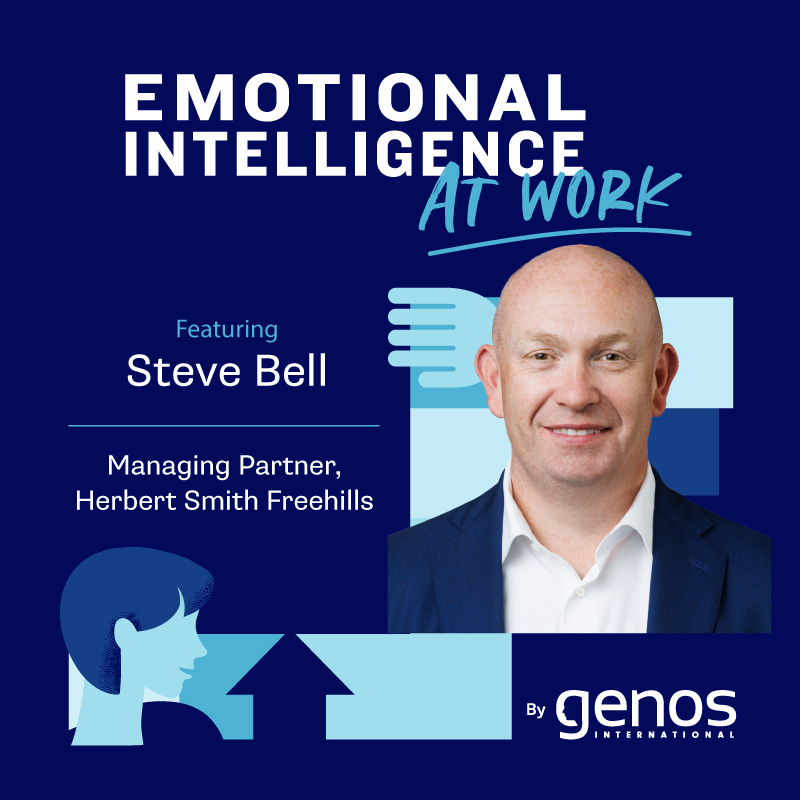
Psychological Safety and Legal Obligations in the Workplace
Take immediate action. The world is placing tremendous emphasis on psychological safety, and Australia has already undergone significant legal changes regarding an employer’s duty of care. Similar shifts may even be imminent in New Zealand. Breaching these regulations carries severe legal consequences, but the moral, reputational, and cultural fallout could be even worse. Don’t wait any longer—prepare your organisational response now.
In this gripping episode of EI at Work, workplace health and safety expert Steve Bell, Managing Partner at Herbert Smith Freehills, shares indispensable insights on risk management, legal protection, and incident response.
Steve is the Managing Partner – Employment, Industrial Relations & Safety (Australia & Asia) at Herbert Smith Freehills. He assists clients proactively manage risk in the workplace, and to ensure legal protection in the event of an incident, regulatory investigation or during civil claims from workers injured at work, or who allege breaches of duties of care. He advises on legal compliance, risk and project structuring, as well as supervising the leading Australian team responsible for delivering incident response and safety-related litigation assistance to clients.
Together with Dr Ben Palmer, CEO, Genos International and Marie El Daghl, Managing Director, Chasing Albert, he discusses psychological safety, poor psychosocial cultures, and positive duties of care.
This is your opportunity to stay ahead and safeguard your team and business. Act now before it’s too late.
Without a doubt – The time to tackle psychological safety is now. In this episode, learn:
[00:01:01] – The changes in the law regarding an employer’s duty of care and the introduction of positive duties of care in Australia.
[00:02:47] – Insights on the current climate of psychological safety and the types of cultures that suffer from poor psychosocial safety factors.
[00:05:07] – Factors that have driven the change in the law regarding psychological safety, including the Respect at Work report and the poor experience of women in the workplace.
[00:07:52] – The positive duties of care introduced by several states and territories in Australia, and the consequences of breaching health and safety laws.
[00:08:51] – Steve Bell explains the principle of insurance and criminal fines, and how some states and territories prohibit insurance policies that cover the outcome of a work safe prosecution.
[00:11:44] – Dr. Ben Palmer discusses the huge costs associated with poor psychological safety, including recruitment, retention, and employment brand, and the impact on innovation and collaboration.
[00:15:37] – Dr. Ben Palmer discusses the three key pillars of psychological safety at work: job design, reactive mental health, and proactive psychosocial culture.
[00:18:40] – Steve Bell talks about the shift towards a victim-centric response to adverse behavior at work, with a focus on due process and dealing with broader problems.
[00:20:42] – Dr. Ben Palmer and Steve Bell discuss the need for a multidisciplinary approach to psychological safety, with involvement from health and safety professionals, HR, and the board of directors. They also emphasize that leading psychological safety is everyone’s business.
[00:23:49] Dr. Ben Palmer discusses the three Cs model, which includes courage, curiosity, and collaboration, and how it can help solve issues proactively.
[00:24:38] – Steve Bell and Dr. Ben Palmer discuss concerns about psychological safety, including the increase in bullying claims and the challenge of drawing the line between material issues and stress-free work environments.
[00:29:23] – Steve Bell explains the changes in work health and safety laws in Australia, including the introduction of positive duties of care and the need for employers to demonstrate movement towards meeting these standards.
[00:31:16] Steve Bell discusses the changes in the law regarding an employer’s duty of care in Australia and the potential for similar changes in New Zealand.
[00:32:36] – Dr. Ben Palmer shares his insights on the current climate of psychological safety in New Zealand and the types of cultures that suffer from poor psychosocial safety factors.
[00:35:01] The speakers discuss the conflict of interest in reporting bad news about health and safety to the board of directors and the importance of truth-telling in health and safety reporting.

About Steve Bell
Steve assists clients proactively manage risk in the workplace, and to ensure legal protection in the event of an incident, regulatory investigation or during civil claims from workers injured at work, or who allege breaches of duties of care. He advises on legal compliance, risk and project structuring, as well as supervising the leading Australian team responsible for delivering incident response and safety-related litigation assistance to clients.
Steve represents clients at inquests and inquiries and is acutely aware of the impact incidents have, not only on those directly involved, but the wider workplace and company stakeholders.
Steve regularly presents to boards and executives, industry forum groups and management committees on emerging issues affecting workplace regulations.